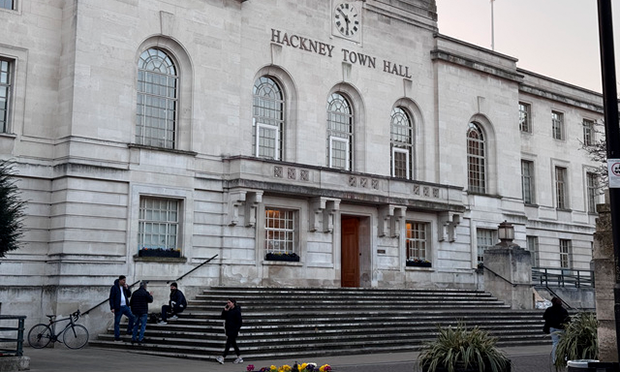Council to close four primary schools as pupil numbers collapse

Hackney Town Hall. Photograph: Josef Steen / free for use by LDRS partners
Hackney Council has confirmed it will close four of the borough’s primary schools in September due to falling pupil numbers and mounting financial deficits.
The controversial plans put forward in September were rubber-stamped at last night’s cabinet meeting, as deputy mayor and education chief, Cllr Anntoinette Bramble, and her colleagues voted in favour of closure following months of public consultation and protests.
Cllr Bramble said the decision was not taken lightly but it was necessary to “safeguard the quality of education” in Hackney.
St Dominic’s Catholic Primary School, St Mary’s Church of England Primary School, Oldhill Community School and Sir Thomas Abney Primary School will now permanently close from September.
Pupils from Oldhill are to merge with the cohort of Harrington Hill Primary School in Clapton.
Sir Thomas Abney children will be transferred to Holmleigh Primary School in Stamford Hill.
The decision comes amid a long-term decline in registered pupils which has hurt the institutions’ financial viability.
Under the National Funding Formula (NFF), the government allocates core funding for a school based on its pupil numbers.
The closures follow the decision to shut four other Hackney primaries last year under similar circumstances.
During last night’s meeting, Cllr Bramble pointed to school census data taken in January this year, which showed 613 reception places in Hackney had gone unfilled, “equivalent to over 30 empty classrooms”.
She added that from Reception to Year 6, thousands of unoccupied school places amounted to roughly 130 empty classrooms across the borough.
Each school had an “unrecoverable” budget deficit, council documents stated, with St Dominic’s’ projected to reach nearly £1m by the end of the 2025/26 financial year.
“Every time a school doesn’t have enough children to take up the places and there is less money brought into those schools, not only is the everyday education in those lessons at risk,” Cllr Bramble said, “[but] the rich breadth of extracurricular activites – everything parents, educators, children love about the schools – all of that would be at risk.”
Cllr Claudia Turbet-Delof (Independent Socialist) asked the cabinet whether the council would take stock from a process parents felt had been “fast-paced” and had not addressed core problems affecting pupil numbers, such as the housing shortage and the cost of living.
Her colleague, Cllr Penny Wrout, challenged the council on why it had not prepared a way to guarantee special needs pupils were transferred to educational settings that “guaranteed continuity of teaching staff”.
To this, Cllr Bramble said that under statutory guidance the Town Hall “unfortunately” could not mandate that specialist staff be employed elsewhere.
However, school vacancies could be advertised internally to those educators and support workers whose schools were closing, giving them the first opportunity to apply.
Turning to the wider factors, the deputy mayor said the cost-of-living crisis and the problem of residents leaving city centres affected the whole of London and not just Hackney, but nevertheless it was the council’s role to respond.
The Town Hall has now published how it plans to support those closing schools in the interim.
Laura-Louise Fairley, a Green Party activist who was present at the meeting, said she was “heartbroken and furious” by the decision, and urged the council to stand up to the government over the school funding formula.
She also accused Labour of “filibustering” by heaping praise without scrutiny.
“There was no accountability and no shame.”
The Hackney Independent Socialist Group said the Labour-run administration needed to “understand how deeply damaging it is to an entire area” when schools are forced to shut.
They accused Hackney’s cabinet of “essentially rubber-stamping” a decision made months prior.
“It’s less than a year since they shut another four schools, but they’ve learnt no lessons from those closures or from what the school communities soon to be axed have told them,” the group said.
“Why is the council not fighting to change the flaws in the funding formula, which penalise schools as soon as classes drop below 30 students?
“Labour councillors wring their hands and apologise, seemingly in denial that their own government is doing nothing to help the situation.”
The Citizen asked the Town Hall if it had engaged with Islington Council in its plans to pressure City Hall and the government to change the NFF, so as to avoid future school closures.
Islington is to decide on similar proposals to close two of its primary schools tomorrow evening.
A Town Hall spokesperson said Hackney staff were in contact with its neighbouring borough about how both councils could “work in partnership to tackle the wider issue of falling rolls”.
In a statement this morning, Cllr Bramble said: “We know that this decision will be difficult for our children, families and members of staff.
“Our schools have built a lasting legacy within their local communities, and their absence will be profoundly missed.
“But great schools are the rule, not the exception in our borough – and families going through the transition will find a new place for their child where they will receive just as much care, love and support as they have in the past.”
A Hackney Labour spokesperson said, after “hard work” from the Labour-run administration, the borough’s education had turned from one of London’s worst-performing authorities to one of the best in the country.
“No-one wants to be in a place to consider closing schools but we simply have more spaces in schools than we have children to fill them, and that continues to be a growing problem,” the spokesperson said.
“Numerous things have helped to create this challenging situation which are unfortunately outside of the council’s control.
“So, we are taking these difficult decisions to make sure all our schools can run efficiently and continue to provide the best education they can in order for the children to thrive.”
